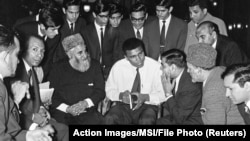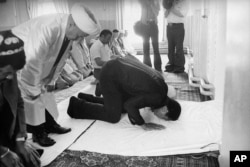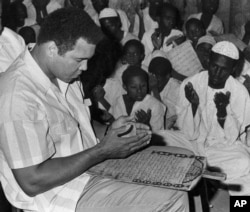As the world mourns the death of Muhammad Ali, some American adherents of the Islamic Sufi tradition are claiming spiritual kinship with the boxing great. But scholars say the assertion may be more urban legend than fact.
“There is no question that Ali himself had an interest in and inclination towards the mystical practice of Islam,” said Omid Safi, director of Islamic Studies Center at Duke University who met Ali in 2004 and spent a day with him at the Muhammad Ali Center in Louisville, Kentucky.
“But was he a Sufi? What we can say with certainty is that he was a careful student of the universal Islamic mystical teachings of (Sufi pioneer) Hazrat Inayat Khan, and met with different Muslim Sufi teachers.”
Since Ali’s death on June 3, social media has been abuzz with reports of those encounters.
On June 4, Zia Inayat Khan, the grandson of founder Inayat Khan and current head of his eponymous order, posted an article on his Facebook page about “one little known and interesting fact” - that Ali had inspired Johnny Cash to record Truth, a poem by Hazrat Inayat Khan who is widely credited with pioneering Sufism in America in the twentieth century. (Watch Ali reciting Truth)
Naqshbandi 'path'
The same day a Facebook page dedicated to a deceased master of the Naqshbandi order, one of the largest Sufi groups in the U.S., posted an undated photo of Ali with the sheikh, along with a claim that the late boxer had “accepted the Naqshbandi spiritual path.”
And on June 5, the official Facebook page of the Naqshbandi order’s current American spiritual leader followed with a video post showing Ali visiting the sheikh’s house in Michigan in 2001 and taking part in what it described as a “bay’a” initiation rite.
Whatever their intent, the posts left fans gushing.
“Thank you for enlightening (us) about Muhammad Ali’s associations with” Inayat Khan’s teachings, one fan effused on Zia Inayat Khan’s page.
A follower of the Naqshbandi order’s page adulated Ali as “a Sufi Muslim brother,” while another, evidently swayed by the initiation rite video, christened him “Muhammad Ali Naqshbandi.”
The claim that Ali was a “Sufi” has not been limited to social media. Several press reports have picked up on the theme, propped up by a resurfaced interview with Ali’s daughter Hana Yasmeen Ali. In the 2004 interview with the religion website Beliefnet, she said that Ali “is more spiritual now than he’s religious,” had stopped praying five times a day and kept a collection of Inayat Khan’s teachings, which he considered “the best books in the world.”
No evidence of affiliation
While the interview highlights Ali’s deep interest in spirituality, scholars say media reports that Ali may have “converted” from Sunni Islam to Sufism are misleading.
“That is a mischaracterization of the relationship between Sufism and Sunni Islam,” Safi of Duke University said. “Sufism is not a separate religious tradition. It is simply the mystical dimension within Islam. “
What is more, there is no evidence that Ali was formally affiliated with a Sufi brotherhood, said Kabir Helminski, a Louisville-based sheikh of the Mevlevi Sufi order and translator of several books of poetry by Rumi, the 13th century Sufi poet.
“I doubt Muhammad Ali was the murid (spiritual follower) of any particular sheikh but his heart was in Sufism,” Helminski said in an interview.
Ali himself never claimed membership in any Sufi order. Recruited into the Nation of Islam in the early 1960s by Malcom X, he espoused the group’s militant ideologies before abandoning them for Orthodox Sunni Islam after the death of founder Elijah Muhammad in 1975.
'I've changed what I believe'
Elijah Muhammad’s son and successor, Wallace Deen Muhammad, “started teaching the true meaning of the Quran,” Ali is quoted as saying in his authorized 1991 biography, Ali: His Life and Times. “But I’ve changed what I believe, and what I believe in now is true Islam.”
Biographer Thomas Hauser calls Ali “deeply religious and spiritual” but in his biography makes no reference to Ali’s initiation into Sufism and meetings with Sufi masters.
As relayed to Hauser, Ali’s religious beliefs had moderated into a more universalist acceptance of faith by 1980s, a far cry from his fiery Black Muslim pronouncements of the 1960s.
“[It] don’t [sic] matter what religion you are, if you’re a good person, you’ll receive God’s blessing,” Ali told Hauser.
The two Sufi orders Ali has been associated with are among the largest of a dozen orders active in the United States. Their membership runs in the tens of thousands. Led by Zia Inayat Khan, a traditional Muslim, the “universalist” Inayati Order counts many non-Muslims among its 7,000 members worldwide.
Asked about Ali’s association with the order, Zia Inayat Khan said by email, “I know that Muhammad Ali met with my father and (Indian spiritual guru) Shri Chinmoy together at some point in the early seventies. From what I understand, he seems to have revered all holy prophets, including non-Qur'anic ones like Buddha, and that suggests a universality that is in keeping with Hazrat Inayat Khan's vision.”
With origins in South and Central Asia, the Naqshbandi-Haqqani Sufi Order of America, the group that disseminated the video of Ali’s purported initiation, is the second largest in the US and seen as more traditional in its practice. Kabbani, Its leader Lebanese-born leader, has found himself entangled in controversy with other Muslims and recently landed on an ISIS “hit list” of prominent Western Muslims.
Ali was not the first prominent Muslim the group has claimed to have initiated.
“Sheikh Kabbani has been known to give hand to almost anyone he can,” said Imam Feisal Abdul Rauf, who led a Sufi mosque in New York City.
Whether Ali was consciously taking part in a Sufi initiation rite remains in question. Scholars who have watched the video, though, say Ali may have simply thought he was receiving a blessing from a holy man.
“I doubt Ali knew what was going on,” Bruce Lawrence, a Duke historian who’s written extensively about Sufism, said after watching the clip.
A Naqshbandi spokeswoman didn’t respond to questions about the video and requests for an interview with Kabbani.
Though claims of Ali’s initiation into a Sufi order appear overblown, Imam Feisal of the Cordoba House says Ali’s spirituality reflected the values of Sufism.
“Sufism is actually the spirit of Islam and it is that spirituality that appealed to Ali,” he says.
Saint worship is central to traditional Sufism, and in Ali, many Sufis, whether or not they see him as one of their own, may have found an object of veneration.
“He is going to be buried a few blocks from where we pray,” says Helminski, who leads a small group of Sufis in Louisville and will be attending Ali’s funeral on Friday along with other Sufis. “We’ll have our own Islamic Sufi shrine here.”


